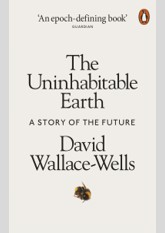The Uninhabitable Earth: Life After Warming
4
In depth insight on climate change
-A couple of pages into the book, Wallace-Wells drenches you in climate anxiety; he has good reasons to do so. Heat waves, sea-level rise, hunger, wildfires are some of the crises we face today due to climate change and are likely to face worse versions of, in near future. - He talks about the inequality of climate change effects - how the countries most responsible for it are likely to face fewer adversities. Countries along the equator will be worst hit and unfortunately these include underdeveloped and developing nations. - Climate change isn't merely an ecological crisis; it's far-reaching and influences every sphere of life. I found this to be quite horrifying. - The data in the book can sometimes be overwhelming, and boring, too, but it forms the basis of everything that the book claims. - As somebody who's already concerned about the ecological crises we're facing, I found this book to be insightful, focusing on dimensions I hadn't come across before. Overall, The Uninhabitable Earth is an interesting read for anyone trying to learn more about climate change

